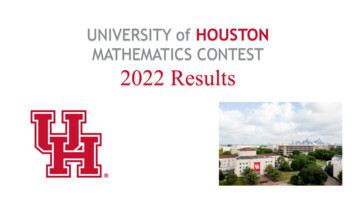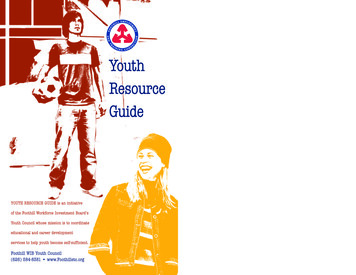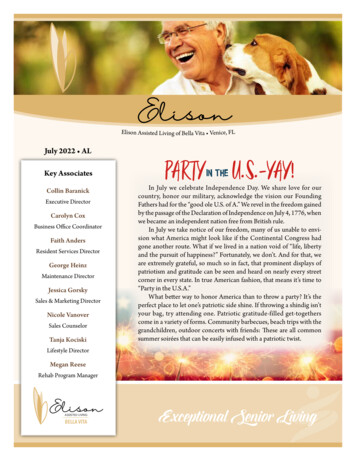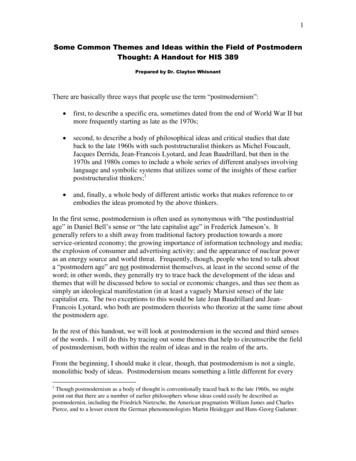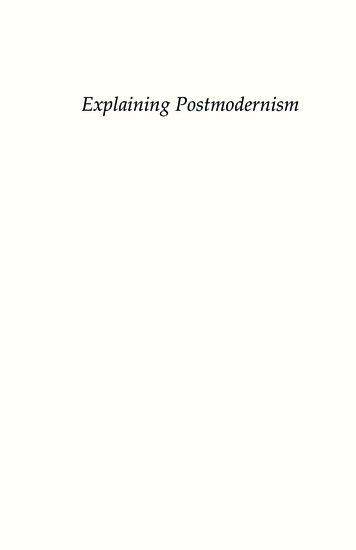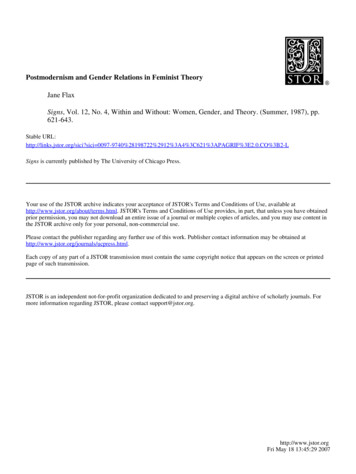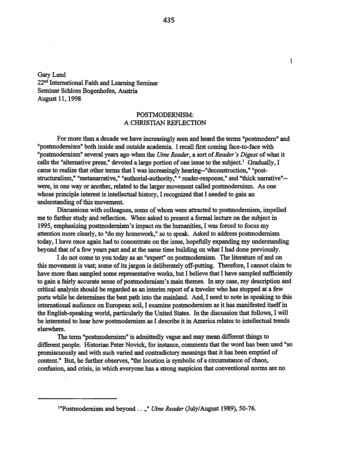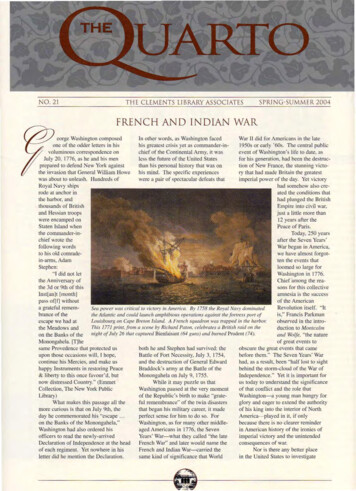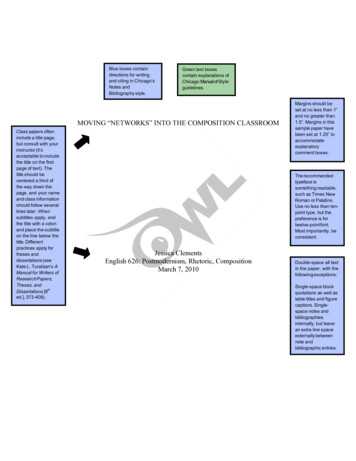
Transcription
Blue boxes containdirections for writingand citing in Chicago’sNotes andBibliography style.Green text boxescontain explanations ofChicago Manual of Styleguidelines.MOVING “NETWORKS” INTO THE COMPOSITION CLASSROOMClass papers ofteninclude a title page,but consult with yourinstructor (it’sacceptable to includethe title on the firstpage of text). Thetitle should becentered a third ofthe way down thepage, and your nameand class informationshould follow severallines later. Whensubtitles apply, endthe title with a colonand place the subtitleon the line below thetitle. Differentpractices apply fortheses anddissertations (seeKate L. Turabian’s AManual for Writers ofResearch Papers,Theses, andthDissertations [8ed.], 373-408).Margins should beset at no less than 1”and no greater than1.5”. Margins in thissample paper havebeen set at 1.25” toaccommodateexplanatorycomment boxes.The recommendedtypeface issomething readable,such as Times NewRoman or Palatino.Use no less than tenpoint type, but thepreference is fortwelve-point font.Most importantly, beconsistent.Jessica ClementsEnglish 626: Postmodernism, Rhetoric, CompositionMarch 7, 2010Double-space all textin the paper, with thefollowing exceptions:Single-space blockquotations as well astable titles and figurecaptions. Singlespace notes andbibliographiesinternally, but leavean extra line spaceexternally betweennote andbibliographic entries.
Arabic page numbersbegin in the header ofthe first page of text.Chicago’sNotes andBibliographystyle isrecommendedfor those in thehumanitiesand somesocialsciences. Itrequires usingnotes to citesources and/orto providerelevantcommentary.1In Democracy and Other Neoliberal Fantasies, Jodi Dean argues that “imagininga rhizome might be nice, but rhizomes don’t describe the underlying structure of realnetworks,”1 rejecting the idea that there is such a thing as a nonhierarchicalinterconnectedness that structures our contemporary world and means of communication.Michael Hardt and Antonio Negri, on the other hand, argue that the Internet is anexemplar of the rhizome: a nonhierarchical, noncentered network—a democratic networkwith “an indeterminate and potentially unlimited number of interconnected nodes [that]In the text,note numbersaresuperscripted.In the notesthemselves,note numbersare full sized,not raised, andfollowed by aperiod.Note numbersshould be placedat the end of theclause orsentence towhich they referand should beplaced after anyand allpunctuationexcept the dash.communicate with no central point of control.”2 What is at stake in settling this dispute?Being. And, knowledge and power in that being. More specifically, this paper exploreshow a theory of social ontology has evolved to theories of social ontologies, how themodernist notion of global understanding of individuals working toward a common(rationalized and objectively knowable) goal became pluralistic postmodern theoriesembracing the idea of local networks. Furthermore, what this summary journey oftheoretical evolution allows for is a consideration of why understandings of a worldcomprising emergent networks need be of concern to composition instructors and theirpractical activities in the classroom: networks produce knowledge.Our journey begins with early modernism, and if early modernism had a theme, itwas oneness. This focus on oneness or unity, on the whole rather than on individual parts,1. Jodi Dean, Democracy and Other Neoliberal Fantasies: CommunicativeCapitalism and Left Politics (Durham: Duke University Press, 2009), 30.2. Michael Hardt and Antonio Negri, “Postmodernization, or the Informatizationof Production,” in Empire (Cambridge, MA: Harvard University Press, 2000), 299.Footnote 1 comprises a complete bibliographic “note” citation for a book, which corresponds to a slightly differently formattedbibliography entry. Subsequent note citations can and should be shortened to Dean, Democracy and Other NeoliberalFantasies, 30. When all sources are cited in full in a bibliography, the shortened version can and should be used from the firstnote forward. “Shortening” usually comprises the author’s last name and a “keyword” version of the work’s title in four or fewerwords.Note numbersshould begin with“1” and followconsecutivelythroughout agiven paper,article, orchapter.
Chicago takesa minimalistapproach tocapitalization;therefore, whileterms used todescribe aperiod areusuallylowercasedexcept in thecase of propernouns (e.g.,“the colonialperiod,” vs.“the Victorianera”),conventiondictates thatsome periodnames becapitalized.See theUniversity ofChicagoPress’s TheChicagoManual of Styleth(17 ed.),sections 8.72and 8.73.2derived from Enlightenment thinking: “The project [of modernity] amounted to anextraordinary intellectual effort on the part of Enlightenment thinkers to developobjective science, universal morality and law, and autonomous art according to theirinner logic.”3 Science, so the story went, stood as inherently objective inquiry that couldreveal truth—universal truth at that. Enlightenment thinkers, such as Kant, believed in the“universal, eternal, and . . . immutable qualities of all of humanity”;4 by extension,“equality, liberty, faith in human intelligence . . . and universal reason” were widely heldbeliefs and seen as unifying forces.5 In fact, Kant believed that Enlightenment (freedomfrom self-imposed immaturity, otherwise known as the ability to use one’s understandingon his or her own toward greater ends)6 was a divine right bestowed upon and meant tobe exercised by the masses.7 Later modernists began to acknowledge the fragmentation,ambiguity and larger chaos that characterized modern life but, perhaps ironically, onlyso they might better reconcile their disunified state.8 This later modernism was labeled“heroic” modernism and was based on the precedent set by romantic thinkers and artists,In footnotesciting the samesource as theone preceding,use a shortenedform of thecitation, as innote 4 here. Thetitle of the workmay also beomitted if thenote previousincludes the title,as in note 5.3. David Harvey, The Condition of Postmodernity: An Enquiry into theOrigins of Cultural Change (Malden, MA: Blackwell, 1990), 12.4. Harvey, 12.5. Harvey, 13.6. Immanuel Kant, “An Answer to the Question: What is Enlightenment?” inPerpetual Peace and Other Essays, trans. Ted Humphrey (1784; repr., Indianapolis:Hackett, 1983), 41.7. Kant, “What is Enlightenment,” 44.8. Harvey, The Condition of Postmodernity, 22.IMPORTANT: The use of “Ibid” in footnotes is discouraged as of theth17 edition of CMOS (section 14.34).When an editor’sor translator’sname appears inaddition to anauthor’s, theformer appearsafter the latter innotes andbibliography.Bibliographic“Edited by” or“Translated by”should beshortened to“ed.” and “trans.”in notes. Pluralforms, such as“eds.,” are neverused.
3which accounted for the “unbridled individualism of great thinkers, the great benefactorsof humankind, who through their singular efforts and struggles would push reason andcivilization willy-nilly to the point of true emancipation.”9 Yet heroic modernists stillseemed to ascribe to the overall Enlightenment project that suggested that there exists a“true nature of a unified, though complex, underlying reality.”10 Even the latest “high”modernists believed in “linear progress, absolute truths, and rational planning of idealsocial orders under standardized conditions of knowledge and production.”11 Ultimately,modernism was about individuals moving in assembly-line fashion toward a (rational andinherently unified) common goal. This ontological understanding rested on what Lyotardwould call a “grand narrative.”Lyotard sees “modern” as fit for describing “any science that legitimates itselfwith reference to a metadiscourse of this kind making an explicit appeal to some grandnarrative, such as the dialectic of Spirit, the hermeneutics of meaning, the emancipationof the rational or working subject, or the creation of wealth”;12 in other words, Lyotardcharacterizes “modernism” as a hegemonic story that defined and guided the ways inwhich humans lived their lives. Further, Lyotard defines “postmodernism” as “incredulity9. Harvey, 14.10. Harvey, 30.11. Harvey, 35.12. Jean-François Lyotard, The Postmodern Condition: A Report on Knowledge,trans. Geoff Bennington and Brian Massumi (Minneapolis: University of MinnesotaPress, 1984), xxiii.
4toward metanarratives.”13 Lyotard is not suggesting that totalizing narratives suddenlystopped existing in our postmodern world but that they no longer carry the same currencyor usefulness to the people creating and living by and through them. One of the keytheoretical understandings driving this change is that, according to Lyotard, postmodernknowledge is not “a tool of the authorities” as knowledge (specifically, scientificknowledge) may have been for the moderns; postmodern knowledge allows for asensitivity to differences and helps us accept those differences rather than proffers a“Ellipses,” orthree spacedperiods,indicate theomission ofwords from aquotedpassage.Together onthe same line,they uch as asentenceending period.Use ellipsescarefully asborrowedmaterial shouldalways reflectthe meaning ofthe originalsource.driving urge to eradicate or otherwise unify them.14 Lyotard notes that science, then, nolonger has the power to legitimate other narratives;15 it can no longer be understood to bethe world’s singular metalanguage because it has been “replaced by the principle of aplurality of formal and axiomatic systems capable of arguing the truth of denotativestatements . . . .”16 Lyotard is invested in these (deliberately plural) systems, these “littlenarratives”17 that operate locally and according to specific rules, and he calls them“language games.” The modern (or, more accurately, postmodern) world is too complexto be understood beneath the aegis of one totalizing system, one goal imposed throughone grand narrative: “There is no reason to think that it would be possible to determinemetaprescriptives common to all of these language games or that a revisable consensus13. Lyotard, xxiv.14. Lyotard, xxv.15. Lyotard, 40.16. Lyotard, 43.17. Lyotard, 61.
5like the one in force at a given moment in the scientific community could embrace thetotality of metaprescription regulating the totality of statements circulating in the socialcollectivity.”18 Paralogy, learning how to play by and/or to challenge the rules of aspecific language game is the means fit for postmodernity, not consensus, according toLyotard.19 Ultimately, in his invocation of plural systems rather than a singular system,Lyotard’s attitude toward grand narratives invites a way of thinking and a way ofAlthough notexemplified inthis sample,longer papersmay requiresections, orsubheadings.Chicagoallows you todevise yourown formatbut privilegesconsistency.Put an extraline spacebefore andaftersubheads andavoid endingthem withperiods.understanding the world with inferences of a networked logic. Stephen Toulmin, too,tackles an understanding of contemporary sociality based on (competing) systems ratherthan a singular hegemonic system.In Cosmopolis: The Hidden Agenda of Modernity, Toulmin challenges us toconsider how such different systems, different ways of viewing the world, come to holdsway at different points in time. Like Lyotard, he suggests that we cannot simply do awaywith grand narratives but that we are making progress if we interrogate how and whythey came to be as well as accede to the fact that there might be more than one way ofinterpreting those seemingly domineering capital “S” Systems. Additionally, Toulmindiscounts the vocabulary of narratives (grand or not) and games and instead prefers theterm “cosmopolis.” “Cosmopolis,” according to Toulmin, invokes notions of nature andsociety in relationship to one another; more specifically, a cosmopolis is not a thing inand of itself (it is not nature, it is not society, it is not a story, and it is not a game) but a18. Lyotard, 65.19. Lyotard, 66.
6process, an ordering of nature and society.20 Unlike the seemingly stable cosmopolis ofmodernity that Kant and others present, Toulmin suggests that cosmopolises are alwaysin flux because communities continually converse in an effort to shape and reshape theirunderstanding of their ways of being in their universe. Dominant cosmopolises doemerge to characterize a particular state of persons at a particular time, but that shouldnot prevent us, argues Toulmin, from reading into the dominant rather than with it.Dissensus, then, has a place in Toulmin’s postmodern understanding, too, just as inLyotard’s. We might, in fact, suggest that Lyotard and Toulmin both see the world in itsinterconnected and localized intricacies but use different language to forward their uniqueinterests. While Lyotard is out to critique Habermas and his insistence on the value ofconsensus, Toulmin seeks to disrupt the common narrative of modernity as whole byinterrogating its structuring features. What we need ultimately note is that Lyotard’s andIn standardAmericanEnglish,quotationswithinquotations areenclosed insinglequotationmarks. Whenthe entirequotation is aquotationwithin aquotation, onlyone set ofdoublequotationmarks isnecessary.Toulmin’s ontological commonalities are interrogated by another important thinker,Michel Foucault.In “What is Enlightenment,” Foucault writes, “Thinking back on Kant’s text, Iwonder whether we may not envisage modernity rather as an attitude than as a period ofhistory. And by ‘attitude,’ I mean a mode of relating to contemporary reality; a voluntarychoice made by certain people; in the end, a way of thinking and feeling; a way, too, ofacting and behaving that at one and the same time marks a relation of belonging and20. Stephen Toulmin, Cosmopolis: The Hidden Agenda of Modernity (Chicago:University of Chicago Press, 1990), 67-68.
7presents itself as a task.”21 Foucault, too, questions that there ever was some objectivemeans to an end of unified truth; rather, Foucault suggests that the moderns voluntarilyembraced and enacted that vision. Foucault’s unique contribution, however, was tosuggest that a “disciplinary” society most accurately described the way contemporarieswere relating, acting, thinking and feeling their world. Rather than a voluntary and evenblind acceptance of any such vision, Foucault suggests that a metacognitiveunderstanding or metawareness of the way power flowed in our disciplinary societywould make room for resistance, despite the bleak picture that he often gets accused ofpainting. We may say “bleak” as Foucault writes that “discipline ‘makes’ individuals; itis the specific technique of a power that regards individuals both as object and asinstruments of its exercise.”22 This is a far cry from Descartes nostalgic “I think;therefore, I am” that informed the Enlightenment and most of modernism’s utopianvision of powerful individuals coexisting in a perfectly rationalized, truthful, and unifiedworld.In his grand splitting from Descartes and other Enlightenment and modernistthinkers, Foucault suggests that that the instruments of hierarchical observation,normalizing judgment, and examination are what drives our contemporary disciplinarysociety.23 He asks us to consider how seemingly mundane and beneficent institutions asAside from“Ibid.,” Chicagostyle offerscrossreferencing formultiple noteswith repeatedcontent(especially forlonger,discursivenotes).Remember: anote numbershould neverappear out oforder.21. Michel Foucault, “What is Enlightenment?” in The Foucault Reader, ed. PaulRabinow (New York: Pantheon, 1984), 39.22. Michel Foucault, “The Means of Correct Training” in The Foucault Reader,ed. Paul Rabinow (New York: Pantheon, 1984), 188.23. See note 22 above.
8hospitals and schools (and also asylums and prisons) enact these instruments. Evenarchitecturally, he insists, these institutions are built to “permit an internal, articulatedand detailed control . . . to make it possible to know [individuals], to alter them.”24 Suchsystems work as networks, according to Foucault: “[disciplinary society’s] functioning isthat of a network of relations from top to bottom, but also to a certain extent from bottomto top and laterally; this network ‘holds’ the whole together and traverses it in its entiretywith effects of power that derive from one another: supervisors, perpetuallysupervised.”25 Yes, this represents a hierarchical network (hospitals and schools haveadministrators, asylums and prisons have their own care staff and guards, too), but theimportant thing Foucault wants us to remember is that power is never possessed; it flows“like a piece of machinery” through the network.26Further, Foucault suggests that the threat of penalty lies at the heart of adisciplinary system.27 It is a “perpetual penalty that traverses all points and supervisesevery instant in the disciplinary institutions”; that penalty “compares, differentiates,hierarchies, homogenizes, excludes. In short, it normalizes.”28 In the end the disciplinarysystem is interested in creating well-behaved objects (not subjects, per se). It does thework of unification and disunification at the same time: “In a sense, the power of24. Foucault, “Correct Thinking,” 190.25. Foucault, 192.26. Foucault, 192.27. Foucault, 193.28. Foucault, 195.Use squarebrackets toadd clarifyingwords,phrases, orpunctuation todirectquotationswhennecessary.Beforealtering adirectquotation, askyourself if youmight just aseasilyparaphrase orweave one ormore shorterquotations intothe text.
9Italic type canbe used foremphasis, butshould only beused soinfrequently(only whensentencestructure can’ttake care ofthe job).Writing a wordin all capitalletters foremphasisshould be a“next to never”recourse.normalization imposes homogeneity; but it individualizes by making it possible tomeasure gaps, to determine levels, to fix specialties, and to render the differences usefulby fitting them one to another.”29 A disciplinary society is interested in producingcitizens that will perform productively. But, in addition to observation or surveillance andnormalizing judgment, such an end can only be accomplished through examination,which goes hand-in-hand with documentation: “It engages them in a whole mass ofdocuments that capture and fix them.”30 This turns us as individuals into “cases”: “It isthe individual as he may be described, judged, measured, compared with others, in hisvery individuality; and it is also the individual who has to be trained or corrected,classified, normalized, excluded, etc.”31 Ultimately for Foucault, “Power was the greatnetwork of political relationships among all things,”32 and Foucault represents a powerfulfigure in postmodern thought because he asserts that power is what produces our reality;a hierarchical network of power is our contemporary ontology: “In fact, power produces;it produces reality; it produces domains of objects and rituals of truth. The individual andthe knowledge that may be gained of him belong to this production.”33 Foucault has a29. Foucault, 197.30. Foucault, 201.31. Foucault, 203.32. Nicholas Thomas, “Pedagogy and the Work of Michel Foucault,”JAC 28, no. 1-2(2008): 153.32. Foucault, “The Means of Correct Training,” 205.
10grand legacy of sorts, no doubt, but that does not mean his work has not been challengedor, perhaps more accurately, extended.Nikolas Rose, author of “Control” in his Powers of Freedom: Reframing PoliticalThought, buys into Foucault’s understanding of contemporary society as networked, buthe does not believe we have much to gain by understanding it as a disciplinary society;rather, Rose proposes that we live, work, and breathe as a control society: “Rather thanbeing confined, like its subjects, to a succession of institutional sites, the control ofconduct was now immanent to all the places in which deviation could occur, inscribedTitles that arementioned inthe text itselfor in notes (aswell as in thebibliography)are capitalized“headlinestyle.” Thismeanscapitalizing thefirst letter ofthe first wordof the title andsubtitle as wellas any and allimportantwords,includingproper nouns.into the dynamics of the practices into which human beings are connected.”34 We nolonger need hospitals, schools, asylums or prisons to monitor and correct our activities;instead, our way of being in the world is now personally connected. We are a society ofself-policing (by prompt of none other than the everyday networks in which we partake)risk managers: “Conduct is continually monitored and reshaped by logics immanentwithin all networks of practice. Surveillance is ‘designed in’ to the flows of everydayexistence.”35 Rose challenges Foucault by suggesting that, in a control society, power ismore potent, more dangerous, even. Rather than an institution using disciplinaryintervention to correct deviant individuals, control societies work on the premise ofregulation. This makes power more “effective,” according to Rose, “because changingindividuals is difficult and ineffective—and it also makes power less obtrusive—thusNote that thepage numberis required inall short-formcitations,even if it isthe same asthe previousentry.33. Nikolas Rose, “Control,” in Powers of Freedom: Reframing Political Thought(Cambridge: Cambridge University Press, 1999), 234.34. Rose, 234.Someinstructors,journals ordisciplinesmay prefercapitalization.This meansfollowing theguidelinesabove butexcluding theimportantwords that arenot propernouns.
11diminishing its political and moral fallout. It also makes resistance more difficult . . . [;]actuarial practices . . . minimize the possibilities for resistance in the name of . . .identity.”36 In a control society, deviants are targeted as a collective, and techniques ofcontrol, rather than those of discipline, are meant to preempt crime and risk.37 Foucaultdid not get it quite right, says Rose, because “. . . the idea of a maximum security societyis misleading. Rather than the tentacles of the state spreading across everyday life, thesecuritization of identity is dispersed and is organized. And rather than totalizingsurveillance, it is better seen as conditional access to circuits of consumption and civility,constant scrutiny of the right of individuals to access certain kinds of flows ofconsumption of goods.”38 We are our own tentacles of surveillance; we grant our ownaccess to being, knowledge, and power.“Sic” is italicizedand put inbracketsimmediately aftera word that ismisspelled orotherwisewrongly used inan originalquotation. Youshould do thisonly whenclarification isnecessary(especially whenthe mistake ismore likely to becharged to thetranscriptionistthan to the authorof the originalquotation).Rose eloquently sums up his argument in the following quotation:In a society of control, a politics of conduct is designed into the fabric ofexistence itself, into the organization of space, time, visibility, circuits ofcommunication. And these enwrap each individual life decision and action—about labour [sic], purchases, debts, credits, lifestyle, sexual contracts and thelike—in a web of incitements, rewards, current sanctions and foreboding of futuresanctions which serve to enjoin citizens to maintain particular types of controlover their conduct. These assemblages which entail the securitization of identityare not unified, but dispersed, not hierarchical but rhizomatic, not totalized butconnected in a web or relays and relations.3936. Rose, 236.37. Rose, 236.38. Rose, 243.39. Ibid., 246.A prosequotation of fiveor more linesshould be“blocked.” Theblock quotationis singledspaced andtakes noquotation marks,but you shouldleave an extraline spaceimmediatelybefore and after.Indent the entirequotation .5”(the same asyou would thestart of a newparagraph).
12In addition to clarifying Rose’s understanding of how individuals instate theirown risk management (a new form of “surveillance”) in noncentered, nonhierarchical(non- institutionally-sponsored) networks, this quotation also highlights the significantissue of visibility, or, rather, invisibility of said networks, which is picked up by GiorgioAgamben in Homo Sacer: Sovereign Power and Bare Life.Agamben calls for the replacement of Foucault’s prison metaphor with the idea ofthe “camp” and suggests that “the camp as dislocating localization is the hidden matrix ofthe politics in which we are still living, and it is this structure of the camp that we mustlearn to recognize in all its metamorphoses into the zones d’attentes of our airports andcertain outskirts of our cities.”40 The camp is hidden, more ubiquitous than we recognize,and it is the camp as social construct, the camp as paradigm of contemporary existence,that should capture our attention because “it would be more honest and, above all, moreuseful to investigate carefully the juridical procedures and deployments of power bywhich human beings could be so completely deprived of their rights and prerogatives thatno act committed against them could appear any longer as a crime.”41 Agamben hereargues that power, and the flow of power through networks and its capacity to constructreality, should be discussed in terms of “homo sacer.”“Homo sacer” is “sacred man” and is analogous to a bandit, a werewolf, acolossus and refugee (something that is always already two things in one). It is someone40. Giorgio Agamben, Homo Sacer: Sovereign Power and Bare Life, trans.Daniel Heller-Roazen (Stanford: Stanford University Press, 1998), 175.41. Agamben, 171.Use italics toindicate aforeign wordthe reader isunlikely toknow. If theword isrepeatedseveral times(made knownto the reader),then it needsto be italicizedonly upon itsfirstoccurrence.
13who is stripped of the laws of citizenship and can be killed by anyone for any reasonwithout penalty but, at the same time, that person cannot be sacrificed. It is someone whois removed of all sanctions of the law except the rule that banished that person in the firstplace. Homo sacer represents inbetweenness with possibility. It is to be a Mobius strip,“the very impossibility of distinguishing between outside and inside, nature andexception, physis and nomos.”42 Perhaps the most significant statement Agamben makesabout homo sacer is that “if today there is no longer any one clear figure of the sacredman, it is perhaps because we are all virtually hominess sacri”; we are all homo sacer.43Agamben, here, is deliberately augmenting Foucault by addressing the power of law. Ifthe government denies a place for the refugee in contemporary society, and we are allrefugees, where does that leave us?44 We should be alarmed by such a realization,Agamben argues, because “in the camp, the state of exception, which was essentially atemporary suspension of the rule of law on the basis of a factual state of danger, is nowWhen you useitalics foremphasiswithin aquotation, youhave to let thereader knowthe italics werenot a part of theoriginalquotation.Phrases suchas “emphasisadded,”“emphasismine,” “italicsadded,” or“italics mine”are allacceptable.The phraseshould beplaced either inthe note or inparenthesesfollowing thequotation in thetext itself.given a permanent spatial arrangement, which as such nevertheless remains outside thenormal order.”45 Agamben sees permanency in the camp metaphor, and we can seeaffinities between what Agamben has to say and what Rose has to say when Agambenstates that “in this sense, our age is nothing but the implacable and methodical attempt toovercome the division dividing the people, to eliminate radically the people that is42. Agamben,37. 43. Ibid.,115.44. Ibid., 132-33.45. Ibid., 169 (emphasis added).When a note contains both sourcedocumentation and commentary, the lattershould follow the former. Citation andcommentary are usually separated by aperiod, but such comments as “emphasisadded” are usually enclosed inparentheses. Also notice that when apage range is cited, the hundreds digitneed not be repeated if it does notchange from the beginning to the end ofthe range.
14excluded.”46 We might bring in Rose to ask, then, whether we are self-destructive in ourself-policing: “It was more accurately understood as a blurring of the boundaries betweenthe ‘inside’ and the ‘outside’ of the system of social control, and a widening of the net ofcontrol whose mesh simultaneously became finer and whose boundaries became moreinvisible as it spread to encompass smaller and smaller violations of the normativeorder.”47 Rose readily admits that there are “insiders” and “outsiders,” processes of“inclusion” and “exclusion,” in a control society, and “it appears as if outside thecommunities of inclusion exists an array of micro-sectors, micro-cultures of non-citizens,failed citizens, anti-citizens, consisting of those who are unable or unwilling to enterprisetheir lives or manage their own risk, incapable of exercising responsible self-government,attached either to no moral community or to a community of anti-morality.”48 What is atstake in heeding Agamben’s ontological call to notice the camps in contemporary society,is also about recognizing our precarious status as permanent homo sacri at risk of being(self-) shoved out of a network of privileged “citizens” in our society to a network orcounterpublic of delinquent and at risk non-citizens. Yet, to complicate our understandingof our being in our postmodern world even further, Manuel DeLanda and Bruno Latourask us to take our focus away from people, per se.DeLanda, in A New Philosophy of Society: Assemblage Theory and SocialComplexity, specifically wants to argue that theories of social ontology should not be in46. Agamben, 179.47. Agamben, 238.48. Agamben, 259.“Footnotes” are named because they appear the “foot” of thepage. Chicago also allows for a system of “endntoes.” “Endnotes,”as the name suggests, appear at the end of a paper,article, or chapter—after the text and appendices but before thebi
so they might better reconcile their disunified state.8 This later modernism was labeled "heroic" modernism and was based on the precedent set by romantic thinkers and artists, 3. David Harvey, The Condition of Postmodernity: An Enquiry into the Origins of Cultural Change (Malden, MA: Blackwell, 1990), 12. 4.Harvey, 12. 5.Harvey, 13.
